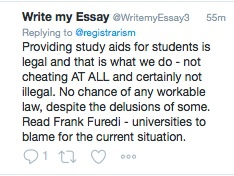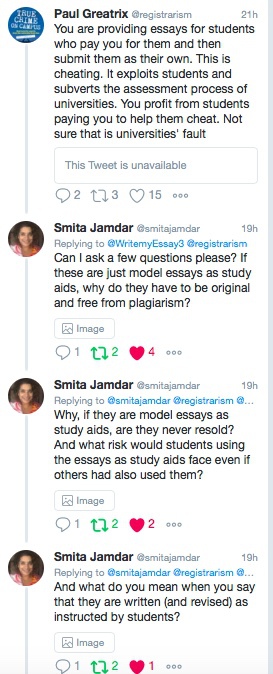I’ve written here quite a few times now, including most recently here but also here, about the corrosive effect of the profiteering essay mill industry and the growing threat it represents to the integrity of UK higher education.
A QAA report in 2016 argued for a multi-faceted approach that builds on published research and the steps that universities and colleges are already taking to promote good academic practice by students, to ‘design out’ opportunities for plagiarism in their assessments and to detect and penalise academic misconduct. It also argued that legislation should be explored to make it an offence to provide or advertise cheating services such as those provided by these essay cheat companies.
Proposals to tackle essay mills did not make into the Higher Education and Research Act but the case for legislation remains compelling. In Ireland they have decided to legislate and recently the Minister for Higher Education, Mary Mitchell O’Connor T.D., announced that the Government has approved a new bill intended to strengthen the hand of Quality and Qualifications Ireland (QQI), the national agency with responsibility for external quality assurance and qualifications across the further and higher education sectors. One of the key amendments introduced in the Bill includes a provision to provide QQI with statutory powers to prosecute ‘essay mills’ and other forms of academic cheating.
Challenging cheating down under
Down under, the Australian reported that a united front was needed to stop the rise of contract cheating at universities:
New legislation, clearer student communication and increasingly sophisticated technology will be needed in the fight against proliferating “contract cheating” services, says Anthony McClaran, head of the Tertiary Education Quality and Standards Agency.
Contract cheating, where essay mills sell students bespoke assignments, essays and even doctoral theses, along with fake doctor’s certificates and degree authentication certificates, has emerged as a vexed issue for universities in much of the developed world.
Increasingly sophisticated technology, the rise of the “sharing” economy and students who struggle to study in a language not their own have combined to jump-start contract cheating services, and campuses across Australia have been targeted with contract cheating leaflets, posters and online communications.
Mr McClaran said he expected the federal Department of Education and Training, with the Council of Australian Governments’ Education Council, would determine whether it was feasible to establish consistent legislation across Australia to effectively outlaw the provision and advertising of cheating services.
These proposals follow the success of the New Zealand government which has introduced legislation leading to successful action against the essay mill profiteers.
Guiding the way
In the UK, we do need to tackle these operations which somehow have managed to retain a veneer of credibility despite being fundamentally dedicated to helping students cheat. Whilst we are still waiting for legislation new guidance was published in October 2017 by QAA on challenging the essay mills and aimed to set best practice around promoting academic integrity in higher education, through tackling students’ use of essay mills and other forms of contract cheating. Among the recommendations in the guidance were the need for HEIs to address:
- clear information for students on the risks of cheating, including academic misconduct being reported to relevant professional bodies
- support for students to develop independent study skills, including academic writing
- using a range of assessment methods to limit opportunities for cheating
- blocking of essay mill sites and action against essay mill advertising on campus
- smarter detection,including new software and greater familiarity with students’ personal styles and capabilities
- appropriate support for whistle blowing – to protect accuser as well as accused
- student involvement on academic misconduct policies and panels.
Matters have gone a step further in the UK with a recent ruling from the Advertising Standards Authority which investigated two issues with one of these essay mills at the behest of the QAA. This post from March 2018 reports on the nature of what is a modest but important win in the battle against the essay mill cheats.
All the fault of universities?
I was slightly surprised recently to find myself in a dialogue with someone from Write My Essay, one of the essay mills, who took issue with an observation I had made:



Then they blocked me, before things could go any further or any amazing Frank Furedi insights deployed. But, helpfully, @SmitaJamdar then decided to ask a few pointed but entirely reasonable questions:

Answer came there none.
But, despite what the shy, retiring Twitter users from Write My Essay may think, legislation in the UK would be a really important step forward.
Beware of the leopard
The essay mills remain a malign influence in our sector. They are corrupting, cynical and exploitative, preying on vulnerable students and exploiting their anxieties for profit. Although they usually do advise students not to submit purchased work as their own, finding these notices can sometimes be a little challenging and you are reminded of how easy Arthur Dent found it to locate the plans to demolish his house at the council offices in The Hitchhiker’s Guide to the Galaxy:
“But the plans were on display…”
“On display? I eventually had to go down to the cellar to find them.”
“That’s the display department.”
“With a flashlight.”
“Ah, well, the lights had probably gone.”
“So had the stairs.”
“But look, you found the notice, didn’t you?”
“Yes,” said Arthur, “yes I did. It was on display in the bottom of a locked filing cabinet stuck in a disused lavatory with a sign on the door saying ‘Beware of the Leopard.”
In reality these companies exist primarily to do the one thing they claim they are not there to do: to help students cheat. All of them present themselves as if they are providing model answers to help with revision but, like Cotton Buds – where the main use to which are they are put is the one thing purchasers are specifically advised not to use them for – their primary purpose is actually something they say (if you can find the notice) they should not be used for, i.e. submitting work as if it were your own.
These parasitical operations, which exploit those who write essays to order as well as those who pay to be helped to cheat, have no place in our sector. I’m delighted therefore that a petition has been launched to seek to persuade the Government to make it illegal to provide or advertise contract cheating services just as they have in New Zealand and in many US states.

Please do sign the petition. The case for legislation remains a strong one if we are to stand any chance of reducing the corrosive influence of essay mills in higher education in the UK.














The last petition got only 1,587 signatures so let’s hope this new one can get more:
https://petition.parliament.uk/archived/petitions/128037
These entirely high-minded and much-misunderstood organisations would presumably be camping out at the doors of Turnitin, waiting for the opportunity to submit their works before passing them on to the client? What with them being so keen to demonstrate their commitment so fighting plagiarism?
…
Oh, look. A squirrel!
I’m glad that the scare quotes of the headline do indeed end up denoting that universities are not to blame for this problem. The people running these plagiarism web sites are shameless, and robust and enforceable legislation is certainly one of the appropriate responses.
I am more interested in the QAA recommendations to HEIs, many of which make good sense. However, a measure such as “greater familiarity with students’ personal styles and capabilities”, although this would be something I would support, comes up against the barrier of anonymous and standards-based assessment. To bring this about we would need to get to know the students and to perhaps instruct them more than once. The idea of bearing in mind their capabilities hints at some form of ipsative assessment. As I say, why not, but these recommendations are pretty much anathema to many of the pressures on universities and it would be reassuring if the QAA could realise this before putting out such things into the public domain.
This one needs to be advertised widely; we can all do our bit. That way, it will get the required attention from the government.
Submitting someone else’s work is not only cheating; it could result in the student not learning anything, which is then useless in the workplace. One of the benefits of writing my own university assignments was that I had to think and learn.
Universities can also play a part in combating cheating by the tasks that they set; for one of my assignments, I had to write about my personal experience in the workplace; there is no way that a complete stranger would have had all the required knowledge. I scored 96% for this one.
I have something special for you
today!
This Profiteering Software App usually
retails at $497 but for my subscribers
it’s FREE!
This is invite only:
http://five-minute-profit-sites.net?CCM114